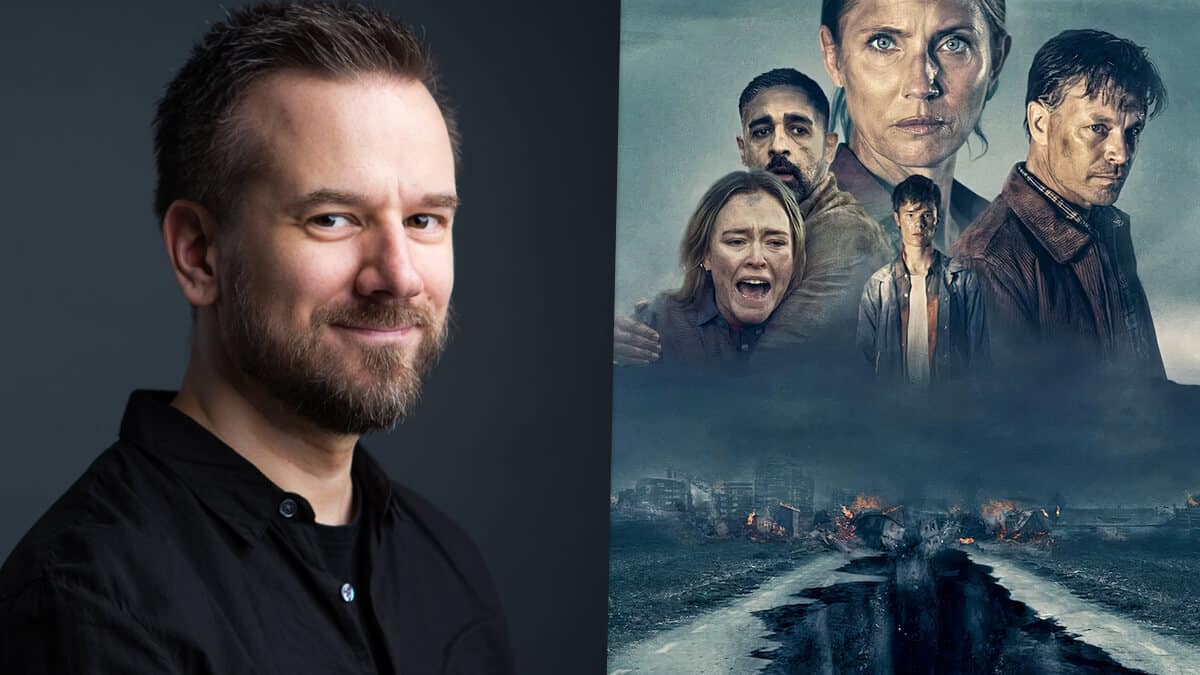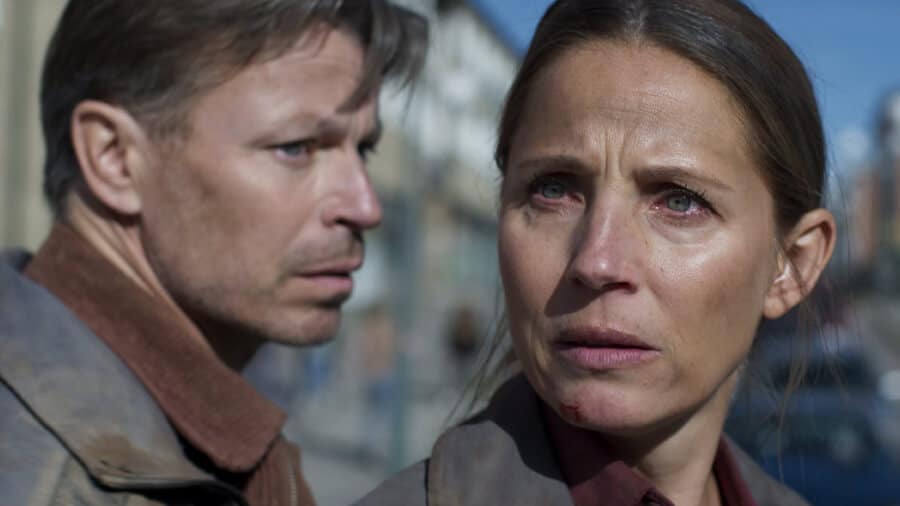
Photo credits: Laura Malmivaara and Netflix
Who doesn’t love a good disaster film like Armageddon or The Day After Tomorrow? That’s perhaps why the new Swedish disaster thriller, The Abyss, was added to Netflix’s lineup and looks to be a home run with the movie currently the number 1 Non-English movie in the world.
The Abyss is set in the real-life Kiruna, Sweden’s northernmost town, which in 2014 had to slowly start moving three kilometers east due to the threat of mining subsidence. Directed by Richard Holm (The Machinery), the film debuted in Sweden back in September 2023 (as Avgrunden) and stars Tuva Novotny (Annihilation), Peter Franzén (Black Lotus) and Kardo Razzazi (Rheingold). The official synopsis for the film reads: As the Swedish town of Kiruna sinks, Frigga finds herself torn between her family and her job as security chief at the world’s largest underground mine. Adding to the thrill ride is the score by composer Lasse Enersen (There’s Something in the Barn), who used handmade old soviet style synths (Soma Synths) to create very organic sounds. You can listen to the film’s score here.
To learn more about The Abyss score, we conducted the Q&A below with Lasse.
WON: First off, how did you become involved with The Abyss?
I had worked with director Richard Holm previously on Seasons 1 and 2 of the Machinery TV series. We got along splendidly and share a passion for the same type of movies. He is a very entertaining director, who never does anything boring. On top of that, he is one of the nicest human beings you’ve ever met.
WON: How would you describe your score for the film?
Composing the score for The Abyss was an emotional journey, mirroring the dual narratives of a city on the brink of disaster and a family grappling with its disintegration. My approach was to blend these themes, treating the crumbling city and the family’s unraveling as one story. The music not only underscores the terror of the mine’s collapse and the city’s descent into chaos, but also delves into the nuanced emotional landscape of a family navigating towards a divorce. The goal was to encapsulate the many emotions that such events evoke, crafting a soundscape that resonates with beauty amid despair. If you don’t care about the family or characters, then the intense scenes in the mine aren’t as effective. Connection with characters raises the stakes dramatically.
WON: Did director Richard Holm have a pretty clear idea of how he wanted the score to sound? Or were you able to bring your ideas to him?
He was certain that he wanted the score to evoke a sense of anxiety while also being emotional. He then let me figure out how exactly to achieve this musically.
WON: The Abyss has a very different vibe than your last film, There’s Something in the Barn. Which of these genres would you say is more difficult to work on? Comedy/horror or action/thriller?
I would say that difficulty is not so much a matter of genre, but rather figuring out the underlying drama and emotional subtext of a particular scene, and its place in the movie’s overall arc. If the script is good, as was the case with both of these movies, then this difficulty is significantly reduced. After that, it becomes crucial to build a really good team with the director, based on honesty and a shared passion for telling this specific story. You must be able to ask seemingly simple questions like, ‘I don’t understand this scene; could you explain it to me?
WON: What would you say is key to making a disaster movie film score, like The Abyss?
I think that when you decide to watch a disaster film, or any other genre movie, you come with certain expectations. As a composer, I aim to meet these expectations, hopefully in a new way. The expression ‘same but different’ comes to mind. And as mentioned before, I believe that making you care about the characters and understanding their inner emotional world is crucial for being thrilled during the intense scenes. So, it is a careful balancing act, not to make the score too action-packed nor too soft and emotional.
WON: Could you tell me about the instrument choices in the score?
The score primarily features electronic and sound design elements in the movie’s intense sections, while the emotional scenes are underscored with piano and strings. My main synths were vintage Soviet-style synths called Soma Synths, known for their amazingly organic sound and beautiful imperfections. I also created completely new synths myself using Cycling ’74:s MAX, inspired by Soma’s Lyra 8, but as a sort of turbocharged version. The score’s terror elements are crafted with slow, gliding synth bass lines that evoke the unsettling sensation of the earth shifting unpredictably. This sense of instability is further amplified inside the claustrophobic confines of the mine, where programmed synths mimic the distressing sound of malfunctioning alarm signals rather than traditional musical notes. A recurring motif in the score is a chord progression that perpetually descends, symbolizing the relentless sinking feeling and the absence of a stable foundation, much like the city and the family’s fortunes. This effect is achieved using a piano treated with heavy delays, allowing the chords to cascade down the mine shafts and reverberate back up.

Picture: Netflix
WON: What was the most difficult scene to score? Why?
It was a scene toward the end of the movie, which I can’t disclose much about without spoiling the story. Initially, I didn’t fully grasp it. After discussing the scene with the director, he clarified the core of the scene in just a few words. This instantly enabled me to compose the music for that scene, making it one of our favorite cues in the movie. This is the dream scenario when collaborating with a director.
WON: Congrats on the film hitting #1 on Netflix, that is a pretty big accomplishment. How does that feel?
It feels incredibly rewarding. I’m fortunate to live in an era where a relatively low-budget movie from Sweden (with Finnish co-production) can stand toe to toe with big-budget Hollywood films in terms of audience numbers. Netflix has changed the landscape.
WON: Is there anything else you would like to add about The Abyss score?
I feel incredibly fortunate to work with a great director like Richard Holm, to have Anssi Leino’s amazing cinematography on my video screen, beautifully edited, and supported by an amazing cast. I’m truly enjoying every moment.
WON: What are you working on next?
I’m currently composing the score for Aku Louhimies’ TV series Conflict, having previously collaborated with him on ‘Unknown Soldier’. It is a political thriller that puts Finland under a military threat.




